
ABOUT
Brian Tai-Shen Wang was born in Taiwan and studied calligraphy from the age of four. His works have been shown in exhibitions at the I.C.A., the University of Lille in France and elsewhere in Europe and around the world.
He has explored six calligraphy styles - five classical and his own unique style entitled - Dream of a Butterfly.
More about Brian
Brian Tai-Shen Wang has produced many Chinese Theatre productions under his own Tai-Shen Theatre Group - most notably 'The Monkey King'
He is the first Chinese community worker in the United Kingdom and worked as a Race Relations Advisor for the London Borough of Hackney.
Brian's efforts in bridging east and west for arts, theatre and communities in the UK gained government recognition and support from then Prime Minister James Callaghan and later Mrs Thatcher government and was later awarded a grant to build a Chinese Community and Culture Centre called 'The Pagoda of One-Hundred Harmony' - The centre was opened in 1982 by the HRH Prince and Princess of Wales, Charles, and Diana.
Brian is also a Master in Tai-Chi.
Notable Exhibition Credits Include:
Royal Institution Library, Liverpool
ICA (Institution of Contemporary Arts) London
Walker Arts Gallery, Liverpool
Portico Library, Manchester
Scarborough Festival
Edinburgh Festival
Edinburgh Arts Workshop
Bath University
University of Lille, France
Brittany Festival
National Theatre Foyer
Hackney Town Hall
The Pagoda of Hundred Harmony, Liverpool
Coopers Gallery
Stalybridge Library
Crucible Theatre, Sheffield
Perry Garden Festival, Oxford
Boston Library USA
Chinatown Association Festival, New York
Suzhou City Hall, China
Arts Depot, Barnet, Camden
The Sanjh Festival – A Chinese Experience
University of Ashton – Birmingham
Concord Festival – by the Yorkshire City Council
Suzhou City in China – Cultural Exchange Program
One of Brian’s passions where he finds inspiration comes from his love on the ice, an avid ice dancer he calls it a “rhythmic and beautiful body coordination sport”.
The famous calligraphy in the Jing Dynasty Wang XiZhi was inspired by the shape of the swan and movement when they swim. Thus, Brian’s calligraphy and passion for ice dancing are mutually inspiring.
The brushwork of his calligraphy, the movement of his ice dancing, and his thought process all resonate with each other.
“When I am writing calligraphy, it is like a dance on ice. And When I am doing ice dancing, It is like I am writing calligraphy with my body. They give me inspiration and artistic excitement. After all, the Chinese characters have six elements, which combine shape, form, action, sound, indication, and metaphor.”
王台生非常擅长起并喜欢溜冰舞,这是一个有韵律,节奏以配合肢体美感的运动。
王羲之的书法灵感来源于鹅的形状和游水的动作,而台生的书法和溜冰舞这个运动是相互启示的。
他很喜欢这个富有艺术感的运动,使得人的肢体形态动作和音乐配合发挥极大的美感。
因此台生的书艺的笔法动作和溜冰舞的身体动作和他的思想的起伏感觉是有共振和共鸣的.
当台生在作书的时候,他感觉书法就像是在冰上自由跳舞的人;当台生跳溜冰舞的时候,也觉得他自己的身体像笔一样写出书法的艺术。他们互相给予灵感和艺术感。中国的文字基于六书(象形, 指示,会意,形声,转注,假借),本来就是包含有形态动作音乐跟表达联合体 。

Brian Ice Dance
Testimonials
在很多事情上有才能的人并不总是会得到应有的称赞。有
一个古老的英语谚语“博而不精的人”。据我所知,中文是
指那些“全身都是刀,但是没有一把是锋利的人”。
我认识王台生先生(Brian Wang)四十多年,他就是那种多
才多艺的人,反而证明那个谚语智慧是错误的。
正如这次展览所展示的那样,他不但是一位精通艺术的书
法家,还是一位企业家,并且成功地将中药带到了英国城
市大街小巷。
作为英国的非官方文化大使,他不仅在推广,导演古典中
国戏剧,也鼓励和支持英国人和其他种族背景的人们与他
并肩努力。他的获奖作品《仙女菊》和《齐天大圣》在利物浦
大教堂表演,加上香港青年乐团的伴奏,令人难忘。
当我们于1978 年在利物浦首次见面时,Brian 是默西群
(利物浦大区)的中国社区主任。我是《利物浦日报》新任命
的“社区关系”记者。我很快意识到他的交友能力,以及他
将自己的角色扮演为一个双向过程:努力改善利物浦中国
人的生活,同时向其他利物浦人介绍中国文化。
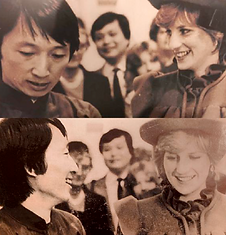
他有建立文化中心的
构想:几年之内就建立
“百祥塔”。同时,他还
积极在利物浦的政治
领导人与其领导人之
间架起桥梁。那些被忽
视的华人社区,和获得
了不同背景的当地华
人的信任和支持。
Photography by Steven Shakeshaft, Liverpool Daily Post
在一个政党政治分歧的城市,他取得了外交成功。一个衡
量标准是他赢得不同党派政客及各种族人士的尊重。另一
个甚至更大的是,当威尔士亲王查尔斯王子和戴安娜公主
来百祥塔中心的开幕仪式,在全国范围内广为宣传。
近年来,Brian 一直在伦敦工作,专心建立Herbal Inn 连锁
店。令人高兴的是他保留书法兴趣并准备再借机会展示他
的作品。
与民间传统不同的是,科学承认并钦佩多才多艺及知识渊
博的之士。Brian Wang 无疑是其中之一。
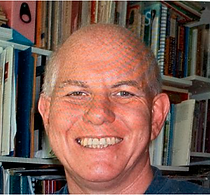
David Utting 英国剑桥MA
David Utting 在成为社会研究
员和慈善基金会的公共事务主
席之前曾在英国区域和全国家
性报纸上担任高级报道员
People who excel at many things do not always receive the praise
they deserve. There is an old English proverb which dismisses
them as ‘Jack of all trades and master of none’, ‘while its
Mandarin equivalent, I’m told, refers to those who are ‘equipped
with knives all over, but none is sharp’.
Brian Wang (Wang Tai Shen), whom I have known for more than
40 years, is the kind of multi-talented individual who was born to
prove proverbial wisdom wrong.
As this exhibition demonstrates, he is an accomplished and
artistic calligrapher, but he is also an entrepreneur and
businessman who has successfully brought traditional Chinese
medicine to the high streets of British cities.
As an unofficial cultural ambassador in Britain, he has not only
performed leading roles in classical Chinese Theatre
himself, but also encouraged and enabled people from English
and other ethnic backgrounds to take part alongside him.His
award winning production of Chrysanthemum Fairy and a
performance of Monkey King in Liverpool Cathedral, with a
traditional orchestra of young musicians from Hong Kong, were
unforgettable.
None of the above were in Brian’s formal job description when
we first met in Liverpool in 1978. He was the Merseyside’s
Chinese Community Relations Officer. I was the ‘community
relations’ reporter newly appointed by the Liverpool Daily Post
and Echo. I quickly became aware of his capacity for making
friends, as well as the way he interpreted his role as a two-way
process: working to improve the lives of Chinese people in
Liverpool, while introducing other Liverpudlians to Chinese
culture.
His idea of building a cultural centre – to be realised within a few
years as the Pagoda of the One Hundred Harmonies –
was already taking shape. He was meanwhile active building
bridges between Liverpool’s political leaders and its
neglected Chinese community, and gaining the trust and support
of local Chinese people of different geographical origins and
affiliations.
One measure of his diplomatic success, in a city where party
political divisions run deep, was the respect he won from
politicians of different persuasions. Another, even greater, was the remarkable ‘coup’ he achieved when Charles and
Diana, the Prince and Princess of Wales, came to formally open
the pagoda centre, receiving nationwide publicity.
For many years now, Brian has been London-based, deeply
occupied with overseeing the Herbal Inn chain of shops. That
makes it even more delightful that he has retained his talent for
calligraphy and taken this opportunity to exhibit it.
Science, unlike folklore, recognizes and admire individuals who
display many talents as ‘polymaths’. Brian Wang is
unmistakably one of them.
David Utting MA Cambridge
David Utting worked on regional and national newspaper in the
UK before becoming a social researcher and public affairs
director of a charitable foundation.
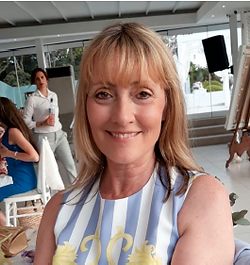
Pamela Abell
(B.A. Hons, P.G.C.E.)
高级讲师
Senior Lecturer in Art and Textiles. (Staffordshire & North Devon)
1975 年, 是我第一次与Brian 相遇,那时我正在利物浦约翰摩尔斯大学纺织设计专业学习。
在1977 年, 我参加了由Brian 指导的书法研学会,并且还加入
了Brian 的太极班。在此之后,我还跟随“台生戏剧社”在利物浦
海王星剧院和伦敦宫廷剧院进行了很多次以“美猴王”为主题的
演出。
我和Brian 的友谊已长达45 年,从1975 年到现在,我非常荣幸
能够见证Brian 才华横溢的艺术造诣。
作为一名职业艺术家和从艺术纺织专业退休的讲师,我参加过
Brian 1978 年在曼彻斯特Portico 图书馆举办的书法展以及英国
其他很多地方的展览。
虽然我对中文一窍不通,但却能感到Brian 的书法是如此美丽和
迷人。他把我带入了一个从未从未感受过的集线条、空间和意识
形态完美融合的精神世界。
Brian 富有创造力的表现风格,成功地让我克服了东西方之间的
语言障碍。
从1970 年代末到1980 年代初,在英国和欧洲,人们对东方之谜
产生了浓厚的兴趣。
Brian 的勇气、热情和独特的创造力得到了发展,并产生了大量
的艺术作品,给包括我在内的许多人带来了喜悦和乐趣。
Pamela Abell
I first met Brian whilst I was studying for my Honours
Degree in Art at the Liverpool University in 1975.
I attended a calligraphy workshop tutored by Brian and
this led me to join his Tai Chi class and later perform in
various performances of ‘Monkey King’ with the ‘Tai
Shen Theatre Group’ both in the Liverpool Neptune
Theatre and London’s Royal Court Theatre in 1977.
This friendship has lasted from 1975 to the present day,
spanning 45 years and in that time it has been a
pleasure to see the talents of Brian flourish. As a
practising artist and retired lecturer in Art and Textiles,
in North Devon and Staffordshire, I visited Brian’s
Chinese Calligraphy exhibition at Manchester’s Portico
Library in 1978 and attended other exhibitions of his
around the country.
In spite of having no knowledge of the Chinese language
I found Brian’s
calligraphy so beautiful and fascinating that it drew me
into a world of line, space and form that I hadn’t
experienced before.
Brian’s style of presentation in the many aspects of his
creativity helped me truly to overcome the language
barrier between my Western understanding and that of
the East.
During the late 1970’s and early 1980’s in the UK and
Europe there was an emerging interest in the mystery
of the East.
Brian’s courage, enthusiasm and unique creativity
developed, and resulted in an abundance of artistic
work, giving delight and pleasure to many including
myself.
Brian’s many successes have enabled people from the
West to appreciate his true talent in his beautiful
artistry of Chinese Calligraphy.
Pamela Abell
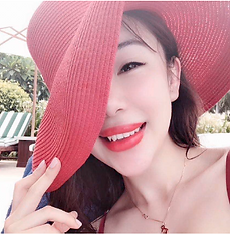
徐倩
上海广播电视台东方卫视中心高级导演
Xu Qian
Shanghai TV Centre Senior Director
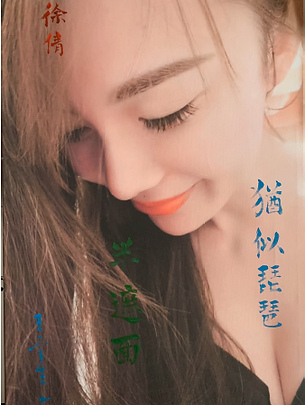
Bashful Side of a Beauty
Commissioned work, reserved by Xu Qian
In 2019, our Shanghai Radio and Television Station "Traditional Chinese Medicine·World" project team went to London, England, and I met Mr. Wang Tai-shen, the founder and chairman of Herbal Inn for the first time.
For thirty years, Herbal Inn has carried forward traditional Chinese medicine in the UK, giving people an alternative to Western medicine. During the filming in London, we were fortunate enough to see Mr. Wang's calligraphy works.
His calligraphy is fluent and flowing, and his pen is like clouds of smoke. The strokes of dragons and snakes give people an intuitive impression of fullness, lightness and heavy reflections within the dot painting. Mr. Wang's writing is a symbol of many years of adulthood, and his strokes are sonorous and powerful.
Mr. Wang has a "heart of a child", and constantly promotes the spread of traditional Chinese culture overseas, and interprets the magical charm of calligraphy. Mr. Wang is funny, humorous, knowledgeable, and extraordinary. Talented people are always low-key and pragmatic and enterprising, Mr. Wang is such a person.
在2019 年,我们上海广播电视台《中医·世界》项目组一行前往英
国伦敦,第一次见到了Herbal Inn 的创始人董事长王台生先生。
三十年来,Herbal Inn 将传统中医在英国发扬光大,给予了人们在
西医之外的另一种选择。在伦敦拍摄的过程中,我们有幸见到了王
先生的书法作品。
他的书法行云流水,落笔如云烟。笔走龙蛇,点画之内给人以丰满
圆转、轻重映带,变化无穷的直观印象。王先生的字,是成年累月
的象征,一笔笔铿锵有力。
王先生拥有一颗“赤子之心”,不断推动中华民族传统文化在海外传
播,演绎书法神奇魅力。王先生风趣幽默,学识渊博,气度不凡。
有才华的人,总是低调的,也是务实进取的,王先生就是这样的一
个人。
在英國華人社會中,王台生可說是奇葩。他天才橫溢,思路敏
銳,敢於創新別具一格。以個人力量,在英國開創一個局面。
1974 年, 王台生從台灣到利物浦大學深造, 在利物浦生活其
間, 他教授太極, 中國古典舞蹈和書法, 並且成立台生劇
團, 創作劇本,以他寫書法的龍飛鳯舞氣勢演繹舞蹈,粉墨登
場, 帶領學生在英倫各地演出,透過他的努力和獨特的風格
向英國社會介紹中國的文化和藝術。深受本地人士贊賞和愛
戴,也打破了一向封闭的華僑社區与主流社會的隔閡。
王台生為了促進中西文化交流的努力,取得了英國政府的認可
和撥款,於1982 年他在利物浦建築了‘百祥塔’,作為中西
文化交流中心及華人社區活動場所。查爾斯皇儲和戴安娜王妃
親臨主持百祥塔的開幕典禮。
其後, 他從利物浦昇遷到倫敦, 為甘頓地方政府的顧問主
任。80 年代末期他轉往商業發展,仍以推展中華文化為己
任,把中醫中藥引進英國,成立Herbal Inn 連鎖中藥店, 分
佈英倫各地,廣受歡迎,並創立英國商標品牌,至今巳銷售英
歐各國三十多年,信誊良好。

王臺生在利物浦I.M.Marsh 舞蹈學院教中國古典舞
認識王台生已經40 多年,在星島日報歐洲版主編的職務上我
有幸鑒証並陸續報導到這一個單身到異地的留學生,赤手空
拳,帶著一批華裔子弟走入英國的群眾裡, 憑著本身頭腦,才
華和毅力,從艱辛奮鬥中走出坦途,寫出一個傳奇故事, 在每
一個角色都做得非常成功。
我對書法藝術並沒有太深的專業研究,不好評論他的書畫是否
巳是登峰造極, 但他始終勇於開創視野,用別出心裁的風格去
開拓蹊徑,自成一家。每個人觀賞的角度看法會不同,但能夠
讓不識中文的外國朋友欣賞和感受,體會與品味中華元素的氣
息,這點和他個人的氣質相似,而在中西合璧又互動中推展著
文化交流來說, 是極有啟發和效果的!
游海龍星島日報歐洲版/ 歐洲商報總編輯(1975- 2016)
Among Chinese in UK, Wang Taishen can be said to be an
unique person. He is talented, keen thinking, daring to
innovate, and be creative. With his personal charisma, he has
broken many new grounds in the UK.
In 1974, Wang Taishen went to the University of Liverpool for
further study from Taiwan. During his life in Liverpool, he
taught Tai Chi, Chinese classical dance and calligraphy, and also
established the Taishen Theatre, he created the scripts with the
imposing manner of the dragon flying and phoenixes dancing in
the way which he writes calligraphy, and show them on the
stage. With students he performed in various parts of the UK
introducing Chinese culture and art to the British society, his
efforts and unique style were highly appreciated and loved by
local people, and also broke the barrier between the
traditionally tightly knit Chinese community and the
mainstream society.
In his achievement of promoting cultural exchanges between
east and the West, he obtained the recognition and funding
from the British government. In 1982, he built the "The Pagoda
of The One-Hundred Harmony " in Liverpool as a centre for
Chinese and Western cultural exchanges and a venue for
Chinese community activities. Prince Charles and Princess
Diana came to preside over the opening ceremony of the
Pagoda.
Afterwards, he was promoted and moved from Liverpool to
London, where he became the Chief Race and Equality Advisor
of Camden Local Government. In the late 1980s, he turned to
business enterprise, still taking the promotion of Chinese
culture as his own responsibility, introducing Chinese medicine
into the United Kingdom, establishing the Herbal Inn chain of
Chinese medicine stores, spreading across the country, and
creating a British trademark brand. So far, the products have
been sold in more than 30 years in the UK and Europe with
excellent reputation.
I have known Wang Taishen for more than 40 years in my
position as the editor-in-chief of the European edition of Sing
Tao Daily, I have had the honour to testify and made reports
that this ‘foreign student’ who was single and went to another
country, with bare hands, walked into the British society
leading Chinese community with wisdom, talent and
perseverance, he worked hard and became a legend wrote a
legendary story, which is very successful in every roles he
undertook.
I don’t have deep professional judgement on calligraphy art. It’s
hard to comment on whether his calligraphy have reached the
pinnacle, but he always has the courage to widen his vision and
use ingenious style to open up his own way.
Everyone's viewing angle will be different, but he can let
foreign friends who do not know Chinese language to feel
enjoyment, inspiration and appreciate the Chinese elements.
This is similar to his personal temperament. He combines
Chinese and Western culture and promotes the method of
cultural exchange in the interaction, which is extremely
enlightening and effective!
Kenneth Yau, Editor-in-Chief,
European Edition, Sing Tao Daily / EU Commerce News (1975-
2016)